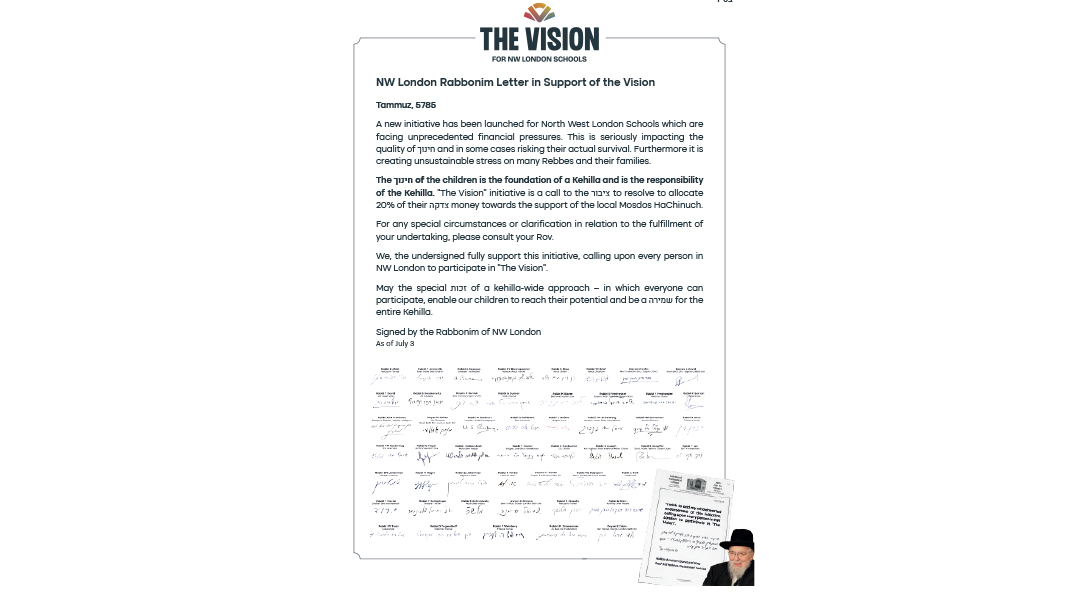More Than Tzedakah
| July 8, 2025We all care about chinuch. But halachah says we owe more than caring, we owe clearly defined financial support

For over a decade, we’ve been involved in school funding and communal infrastructure and direct school leadership in our community in the United Kingdom. We once assumed that school fundraising was a matter of inspiration: better campaigns, stronger appeals, and increased generosity.
But after deep immersion in hilchos tzedakah, decades of communal askanus, and working closely with donors and dayanim, we’ve come to a different understanding: This isn’t just about chesed. It’s about halachic obligation.
The Problem
Baruch Hashem, the frum kehillah continues to grow around the world, and the number of children in Jewish schools across the spectrum grows with it. But in parallel, the demands on our income, along with tzedakah donations, have also grown.
A father recently told us, “My children’s chinuch is nonnegotiable. But the tuition bill is breaking me.”
He wasn’t exaggerating. Between rent, groceries, and school fees, even a solid six-figure income doesn’t feel like enough. Multiply that by thousands of frum families, and you begin to understand our communal paradox: Chinuch is our highest priority, yet the system for funding it is crumbling beneath our feet.
The economy is such that many parents cannot pay the required amount, and schools can no longer rely on a small number of gvirim to pick up the tab for any remaining expenses at the end of the school year. They must rely on the whole kehillah — and it is our responsibility and privilege to provide for them.
The situation is worsening rapidly. Just in our neighborhood of North West London, in 2017, the annual shortfall across the local schools was around £7 million. By 2024, it had reached £12 million.
At the beginning of 2025, the British government implemented a range of financial measures, including raising the minimum wage and increasing employers’ National Insurance contributions. While these changes were intended to benefit employees, they impose a heavy burden on employers, like our schools. Taken together with other government actions, such as removing private schools’ reduction of business rates and, most damaging for many Jewish schools, imposing VAT on school fees, these actions have led to a projected £18 million shortfall in the coming year.
Across 29 institutions, serving over 8,000 children, every single school, whether private or part of the state system, is running at a deficit, leading to poorer provision: staff reductions, budget cuts, and in some cases, potential closure. This is not a one-off, short-term crisis. This is a structural issue, affecting every single Jewish school.
And it’s not just a local problem. Schools around the world are struggling.
The Solution
In 2012, while Eli was researching for the book Easy Giving (co-authored with Emanuel Meyer), he had the zechus to submit detailed sh’eilos to Rav Chaim Kanievsky ztz”l, and consult extensively with ybdlch”t Rav Yosef Fleischman (rosh hakollel of Kollel Choshen Mishpat in Eretz Yisrael).
Here in London, Rabbi Y.M. Greenberg and Rabbi S.F. Zimmerman helped clarify the central point: If a school cannot cover its needs through parent fees or voluntary contributions, there is a Choshen Mishpat obligation on the tzibbur — a matter of din — to fill the gap, each household contributing according to their means.
In 2014, North West London’s three senior rabbanim at the time, Dayan Chanoch Ehrentreu, Rav Elchonon Halpern, and Rav Pinchas Roberts, zichronam livrachah, issued a kol korei declaring: “Each member of the community is obligated to allocate 20% of their tzedakah to support local Jewish schools.”
The figure wasn’t arbitrary. It was calculated based on the known school shortfall across North West London and the total volume of communal tzedakah. And when we re-ran the numbers in 2025, with dramatically higher totals, the ratio remained exactly 20%.
And that’s where The Vision comes in — a project to encourage and enable every family to allocate 20% of their tzedakah to support local schools, by whatever method works best for them.
The Current Situation
The North West London kehillah is very generous, giving over £100 million a year to tzedakah locally. Achisomoch is the largest Jewish Donor Advised Fund (DAF) in the UK, and we see over £70 million a year in tzedakah allocations from over 4,000 families. But from our anonymized aggregate analysis, only about 10% of this goes to chinuch, and only a very select few donors reach the 20% target consistently.
This isn’t a failure of will. It’s a lack of halachically guided structure. While crowd-funding matched campaigns have been very successful, they reduce the concept of prioritization of tzedakah.
There have been previous attempts to remedy the situation. A shul-based initiative, Chomesh L’Chinuch, made tremendous strides in raising awareness of the issue, and together with BEST (a cross-communal product established to benefit local Jewish schools and promote unity within our community), it raised over £500,000 a year — a good start, but far less than required.
We have learned several crucial factors that impact giving:
Donors want autonomy to decide where their money goes, to which schools, in what manner and when, rather than giving to a central fund.
They need tools and support to help them track their 20% to schools.
It must be a whole kehillah project — everyone who gives tzedakah, whether they are giving £1 a year or £10 million a year, has the same obligation to fund essential communal infrastructure, regardless of whether they actually use it themselves. Everyone should give according to their means. We’re not suggesting giving more, we’re implementing giving smarter.
We have already identified over £2 million of new money for schools, from major funds and philanthropists now committing to their 20%. Just as schools’ deficits are international, so too can the solution be international, adjusted to match the needs and potential of the local kehillah. We’ve already had expressions of interest in The Vision’s model from other kehillos around the UK, and from some recognized US chinuch organizations.
Going Forward
Some people feel that the schools are not providing top-notch chinuch or are governed poorly. Rather than recognize the impact that the funding shortfall is having in some areas, they ask why they should continue to fund mediocrity. The Vision’s plans for phase two include exploring a new structure for a School Excellence Framework, with funding, so that schools are equipped not only to survive, but to improve in learning, finance, and governance.
“But what about the other mosdos?” we hear you ask.
Well, many people are already giving around 10% of their tzedakah to local schools, so it’s a 10% diversion of funds. We acknowledge this will not necessarily be so easy, either for donors or for recipients. All the local rabbanim have backed The Vision, and it seems very likely they will be encouraging kehillah members to continue their support of other local mosdos and organizations, especially those that provide essential communal infrastructure such as welfare, addressing poverty, and mikvaos.
While some people have long-established relationships with mosdos in Eretz Yisrael, and it will be difficult to reallocate funds away from these causes, there might need to be a fundamental cultural shift, in which each kehillah prioritizes its own infrastructure, while still showing hakaras hatov elsewhere. We’ve spoken to a number of philanthropists, and the fact that all the rabbanim are aligned on this issue gives extra confidence to those who are strong supporters of mosdos in Eretz Yisrael that this can be decreased, due to what is effectively a new takanas ha’ir.
So, yes, that might mean that some international mosdos will not be able to rely as heavily on local funders, but it is a position strongly supported by halachah. Chazal and the Shulchan Aruch, in their infinite wisdom, set out clearly that funding local essential infrastructure takes priority over other tzedakah causes. And what other fair, universal approach is there to address the situation?
Eli Katz and Aryeh Melinek reside in North West London and are co-founders of The Vision. In addition, Eli Katz is a co-founder of Chomesh L’Chinuch and co-chair of Achisomoch, and Aryeh Melinek is the founder of Ateres Beis Yaakov School and a co-founder of BEST.
(Originally featured in Mishpacha, Issue 1069)
Oops! We could not locate your form.







